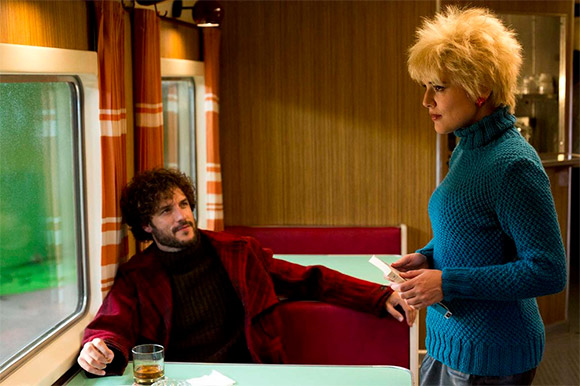

Written/Directed By: Pedro Almodóvar
Cast: Adriana Ugarte, Michelle Jenner, Rossy de Palma,Emma Suårez, Inma Cuesta
Runtime: 1 hr 39 minutes
You may enjoy Julieta (2016) more if you know that it is a women’s film from the melodrama genre and a story of pure emotion. While it is labelled a romance it is nothing like a romance and don’t expect light entertainment or laughs as the film is devoid of humour. What is does have is an outpouring of quintessentially maternal guilt and self-absorbed loss that is palpable throughout the film. While critics may be divided, this is a beautiful film with a long aftertaste.
We meet the attractive widow Julieta just as she is packing to leave Madrid and move with her boyfriend to Portugal. Madrid is full of painful memories, the most intense of which is not seeing her daughter Antia for twelve years. A chance encounter with her daughter’s former best friend opens an uncontrollable torrent of guilt which suddenly fills Julieta’s life. Abandoning her boyfriend, she decides to stay in Madrid in case Antia ever looks for her. Unable to deal with her grief in any other way, she writes the story of her life as if she is talking to her absent daughter.


Julieta narrates the story in chapters that become extended flashbacks to her early romance with Antia’s father, their lives together as a family and its eventual disintegration. What was once a life full of loving relationships becomes one of multiple losses even though Julieta herself bears little blame for the tragedies. Julieta is unaware how deeply her daughter was affected by what happened and is bewildered when Antia searches for spirituality at a Swiss retreat. Her sudden disappearance without explanation has left her mother with unresolved grief.
As each chapter unfolds we see the larger portrait of the mother and daughter relationship in all its dense complexity and destructive power. The narrative teasingly denies us knowledge of why Antia refuses all contact with her mother, and year after year Julieta mourns each passing birthday as if it was a funeral. The storytelling intensity is sustained by finely nuanced acting from the two stars who play the younger and older Julieta, and those who play Antia at different ages. The camerawork has a melancholic sensitivity that resonates with the Spanish landscapes and urban settings, and while the story unwinds slowly, to tell it more quickly would lose depth and meaning. While Julieta is a darkly sensitive essay about the universal emotion of maternal guilt, its melancholy lifts like a rising fog with a masterfully ambivalent ending that soars.

 Richard Alaba, PhD
Richard Alaba, PhD
CineMuse Films
Member, Australian Film Critics Association
Sydney, Australia
Have you seen ‘Julieta’? Well, what did you think?
…

I did hear about this movie but didn’t think much into it but after reading this review, there is no way I’m leaving it. Julieta sounds like a movie that I’ll be thinking about for weeks (maybe more)…
Its been many months since I saw the film but I can still see Julieta treating each birthday of her daughter’s absence like a funeral. Estrangement can be more devastating than loss through death. Julieta just cannot let go of the hope that mother and daughter will find each other.
I really liked this movie and almost wished it would continue past that ending shot to find out even more about these characters.
Ah, was’nt that a masterful scene, full of ambivalence and hope? It was like two girlfriends who had a massive fallout but get back together as if nothing ever happened. Families are like that.
I do want to see this because it’s Almodovar. The man is a master as he is someone whose films I always want to see.
It has had a mixed critical reception, perhaps because of its fixation on the “outpouring of quintessentially maternal guilt and self-absorbed loss”. Being an Almodovar film does not garantee acclaim but it deserves better.
Even if it’s a mediocre Almodovar film, mediocre Almodovar is still better than a lot of other people’s films.